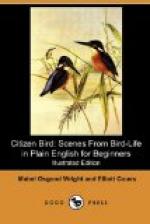“A true account,” said the Eagle; “you stand acquitted. Sparrow Hawk, your turn.”
This charming little Hawk, about the size of a Shrike, had all the beauty of shape and color of a song bird, combined with Hawk-like dash. His wings were narrow and pointed. His back was reddish-brown with a few black bars, and there was a broad one on the end of his tail; his wings were partly bluish. Underneath he was white, shading to cream color and spotted with black. His head was bluish with black markings on the sides and a red spot on the top. He was not at all embarrassed at being in such grand company, for he was used to the best society, having come of noble ancestry in the Hawk line.
“You all know me,” he said in a clear voice. “Since Sparrow-killing is ordered by the Wise Men, you should think well of me—especially you House People, who love song birds. I will tell you a secret—I am thinking of eating no birds but English Sparrows in future!”
[Illustration: Sparrow Hawk.]
“So you have been eating other birds?” said Dodo.
“Y-e-s, I have, but not many more than the Shrike takes, and mostly seed-eaters—hardly ever an insect-eating song bird. Do you know how many bad insects I eat?” The little Hawk rattled off a long list, beginning with grasshoppers and ending with beetles; but he spoke so fast that the children could not remember half the names he mentioned.
“Where do I live? All over North America, though I leave the colder parts in winter, for I like to be comfortable. I make my nest in some snug hole that a Woodpecker has kindly left. Sometimes, for a joke, I kill Sparrows and take their nest! Or make myself a home in a dove-cote—only I never seem to stay there long, for the Doves tell tales about me. I can sing a little, too; I have a high soprano voice and I——”
“That will do,” interrupted the Eagle. “For a small bird you are a great talker. But you are acquitted! Who comes next? Brother Osprey?”
The children recognized the Fish Hawk they had seen the first day they went to the sea-shore.
“The Osprey is a fisherman like myself, so we need not question him about his habits,” continued the Eagle, who had his own private reasons for not caring to hear all the Osprey might say, remembering that he had sometimes stolen fish the Osprey had caught; “but I should like to tell the House Children that he is one of the long-lived birds who mate for life after the manner of true Eagles, many of whom have lived a hundred years, and also very industrious. Golden Eagle, what is your bill of fare?”
“The food of a wild bird of the mountains, far from the homes of men. I seize Wild Ducks and other game birds, hares, rabbits, fawns—yes, and young calves also, if House People make their dwellings near me and bring cattle into my fortress; but if they keep away from me, I never molest them.”
“Humph!” said the Bald Eagle; “you and I are somewhat alike, for though I chiefly fish for a living I also kill the young of large animals, and even eat carrion when game is scarce. But as it is unusual for a judge to condemn himself, I think I must go free; and as there are not very many of either of us, it really doesn’t matter much.”




